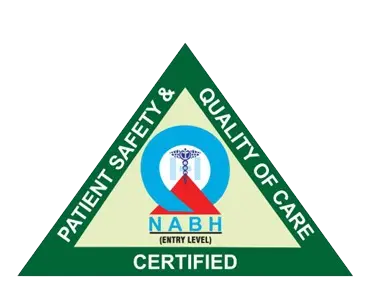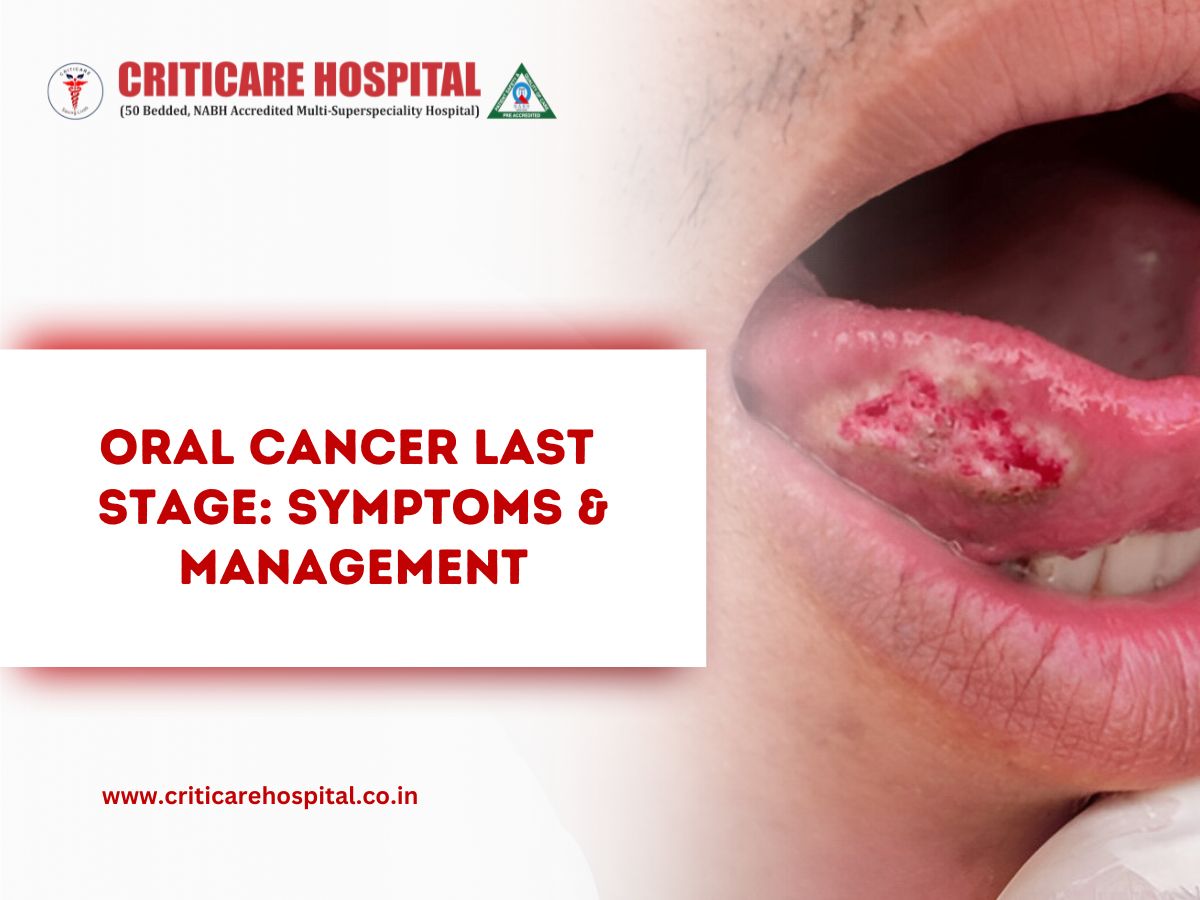Oral cancer becomes much more serious in stages, leading to major effects on a person’s life. At this time, the cancer has become more aggressive, the symptoms are severe, and people usually shift their attention to making the patient more comfortable and happy. If someone close to you is diagnosed, you have to understand the problems you might deal with and the ways to address them.
Criticare Hospital Lucknow thinks that when we join knowledge, care, and teamwork, we can greatly benefit patients who are late-stage oral cancer survivors. We have written this guide to inform you about the types of symptoms, different treatment choices, and supportive care at our hospital in a simple and friendly way.
What is considered Stage 4 oral cancer?
The last and most advanced stage of oral cancer is called Stage 4. Usually, cancer has spread to other parts of the body by this point.
- Spread into structures beside the tooth, such as the jawbone, muscles, skin, or even underneath.
- Move to the lymph nodes that are close to the neck.
- There may be signs that the cancer has moved away from the breast to nearby organs, for example, the lungs or liver.
Because they are considered so serious, each sub-stage (IVA, IVB, IVC) depends on the spread of cancer, and urgent attention is necessary for all of them.
Symptoms of the Last Stage of Oral Cancer
Signs of oral cancer at its last invasive state are usually serious and can negatively impact someone’s daily routines. Here are a few aspects that you should observe.
-
Chronic and strong pain in the mouth
A typical symptom is the experience of constant and frequently severe pain in the mouth or throat. Because the tumor affects the nerves and tissues, the discomfort could stop a person from eating, drinking, or speaking easily.
-
People have trouble with both their speech and swallowing food.
The presence of a growing tumor may result in allergic reactions that involve the throat and make it hard for people to swallow properly (dysphagia) or talk clearly. You could have the feeling that food gets caught when you eat, or notice that your speech is not clear.
-
There are cases where sores cannot heal and continue bleeding.
It is common to develop mouth sores that don’t heal or have bleeding which cannot be explained. A sore might hurt or not; however, when it lasts over two weeks, it should be checked.
-
Lumps and bumps
It is possible to find swelling or lumps in the mouth, gums, or neck. In stage 4, it is frequent for the neck’s lymph nodes to become swollen and seem firm and stuck to other tissues.
-
A Person Suffering From Anorexia Can Lose Weight Quickly and Feel Tired
Losing a lot of weight can happen with advanced cancer, even when you’re eating normally. It usually happens because of the effects of cancer and the challenges people have in eating or swallowing. Having extreme tiredness almost all the time is very common for people with this disease.
-
Changes in the tone of your voice and problems in breathing
Trouble breathing and hoarseness are possible if the tumor impacts the vocal cords or the airways.
-
Affect involvement of Additional Body Parts
Spread of cancer to the lungs may lead to constant coughing, discomfort, or difficulties with breathing. Symptoms in the liver are abdominal pain, jaundice (because the skin and eyes turn yellow), and swelling in the stomach area.
What are the ways to diagnose Last Stage Oral Cancer?
To find out how advanced the cancer is, doctors conduct physical exams, do imaging scans, conduct tissue biopsies, and occasionally conduct blood tests. Having a doctor or dentist properly diagnose persistent problems such as these is very important as soon as possible.
Treatment Methods and Options
A cure is often not possible at this disease stage, but different treatments are available to assist with pain relief, prevent the disease from getting worse, and make people feel healthier. When palliative care begins, the goal is to make the patient comfortable and give support.
-
Palliative Care
This guides the main approach to cancer treatment at the advanced stage. It includes:
- Pain Management: Trying to control pain with medication, along with devices such as nerve blocks and other therapies.
- Treatment of infections involving the mouth or throat is part of Dentistry.
- If it is hard for someone to eat, options like feeding tubes or special diets can be used to keep them strong and full of energy.
- Counselling, joining support groups, and having mental health care for patients as well as their families.
-
Radiation Therapy
Treatment with radiation may cause tumors to shrink, help with pain, and make it simpler to swallow. Doctors provide palliative care when a cure can’t be found, just to enhance the patient’s quality of life.
-
Chemotherapy
Taking low doses of chemotherapy can help stop the cancer from spreading more and deal with the side effects when it affects multiple parts of the body.
-
Surgery
Limited surgery (called debulking) may be done in unusual cases when the tumor causes terrible pain or blocks the airway or food line.
-
Nutritional Support
Since getting enough food is often a challenge, nutritionists help people a lot. Tubes can be added to a person’s mouth or nose to assist with nutrition, or high-calorie products may be needed to avoid malnutrition.
What a Person with Last-Stage Oral Cancer Can Count on
The news of stage 4 oral cancer is usually very hard to accept. A lot of individuals experience feelings of shock, fear, anger, or sadness. Having these emotions is common. You should make sure to do the following:
- Talk with your doctors and find out about your health status, the possible routes of treatment, and what you want most.
- Discuss in advance what kind of treatments you would like and the type of care you want when you are at the end of your life.
- Talk to counsellors, be involved in support groups, or get advice from spiritual leaders. People should not have to deal with this situation alone.
Oral cancer symptoms often look the same as symptoms of other diseases, so how can someone distinguish them? Let’s move further to distinguish them.
Is there a chance to cure the last stage of oral cancer?
Usually, at this stage, a full cure does not happen as cancer has moved outside of the original site. Still, treatment may be able to:
- Prolong life
- Relieve symptoms
- Support you to keep your dignity and comfort for the rest of your days.
Comprehensive care and support are given to help people live as much and as well as they can for as long as they live.
Conclusion:
To conclude, sharing hope, giving support, and doing something active to help. It may be hard to deal with oral cancer in its last stage, but many people can support you. Proper help and support from experts and loved ones allow one to deal with difficulties with strength and integrity. If you or a loved one has ongoing mouth pain, sores on the mouth that won’t heal, or has a problem with swallowing, don’t hesitate to get help.
Experiencing last-stage oral cancer is very tough, yet you don’t have to deal with it on your own. At Criticare Hospital Lucknow, we ensure we walk with each patient, giving expert care, advanced medical treatment, and reliable support to everyone involved. We aim to assist you in living every day comfortably and with hope and dignity.
In case either you or a loved one is showing symptoms of oral cancer or needs special help, Criticare Hospital Lucknow is the place to go. We are ready to help you with every part of your loan process.




